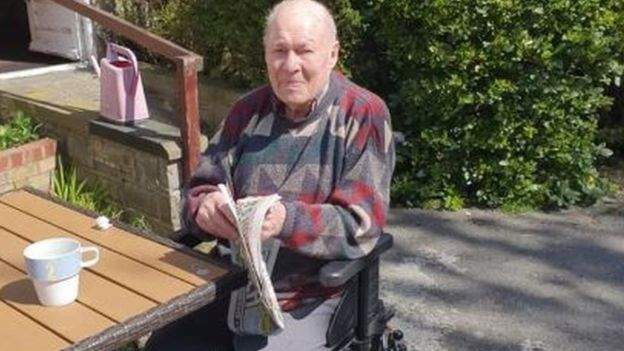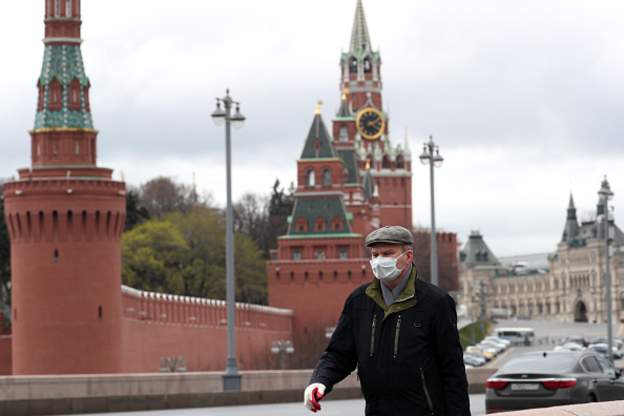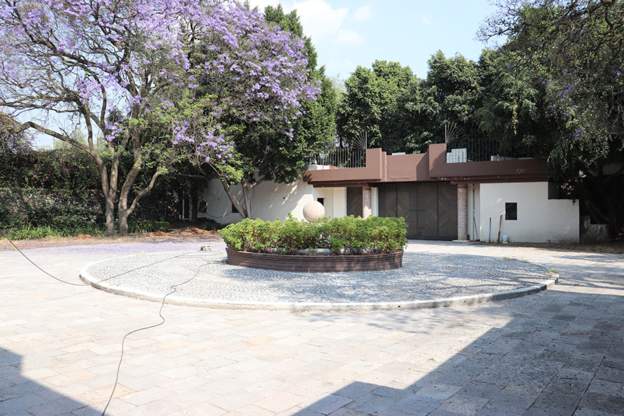Summary for Monday, 4th May
Hello and welcome back to our rolling coverage of the coronavirus outbreak. We're writing to you from Singapore this morning, and will be joined by our colleagues in London later. Here's a quick glance at the main news over the past few hours:
There was also no new fatality, leaving the number of people whose deaths have been linked to Covid-19 at 20.
Overall, there have been only 1,137 confirmed infections and already last week, New Zealand had only single-digit daily cases.
The country has already begun easing lockdown measures, gradually restarting businesses and allowing people to socialise beyond their bubbles.
"We are very confident that we're going to have a vaccine at the end of the year, by the end of the year," he said during a Fox News town hall on the steps of the Lincoln Memorial.
Scientists around the world are currently racing to develop such a vaccine but most experts expect it will only be ready for mass distribution sometime in 2021.
Trump seemed to accept he was getting ahead of his own medical advisors on the prediction of such a fast timeline.
"The doctors would say 'well, you shouldn't say that.' I'll say what I think," he said.
Here are some of the other developments:
Despite the rising numbers, President Jair Bolsonaro continues to argue against most of the lockdown measures imposed by local governors and advised by health officials.
"The destruction of jobs by some governors is irresponsible and unacceptable. We will pay a high price in the future," he told supporters on Sunday.
With the number of daily infections rising sharply, observers believe the peak of the pandemic in South America to be still some weeks away. Experts fear that in Brazil as well as other neighbouring countries, the actual number of cases is several times higher than the official toll.
Outdoor sports facilities, libraries and museums will also reopen from today, though they will still be subject to a ban on gatherings of more than four people.
However, facilities like gyms, cinemas and bars still remain closed.
The government had earlier said social distancing and travel curbs would be extended until at least 7 May - it's not clear if these will be extended.
Last Friday however, protesters defied social distancing measures, with around 100 people gathering to sing a protest song at a central shopping mall.
And as virus measures ease, it's likely we'll begin seeing more of the pro-democracy protests which rocked Hong Kong last year until they were overshadowed by the virus outbreak.
As of 4 May, there have been 3,505,761 cases of the new coronavirus recorded worldwide. Many of those have already recovered though and the number of currently active infections stands at around 2.4 million.
Here are the countries with the most confirmed cases:
US (1,157,945 total, 939,758 active, 67,680 deaths)
Spain (217,466 total, 73,300 active, 25,264 deaths)
Italy (210,717 total, 100,179 active, 28,884 deaths)
UK (187,842 total, 158,421 active, 28,520 deaths)
France (168,925 total, 93,140 active, 24,900 deaths)
Germany (165,664 total, 28,198 active, 6,866 deaths)
Russia (134,687 total, 116,768 active, 1,280 deaths)
Turkey (126,045 total, 59,497 active, 3,397 deaths)
Brazil (101,147 total, 51,131 active, 7,025 deaths)
The data is from the Johns Hopkins University and only counts confirmed cases - in many countries the actual numbers are thought to be higher.
Mr Pompeo did not present any facts to support his claim.
The WHO maintains that the virus is of "animal origin" and not manufactured in a lab.
Two laboratories in Wuhan have come under the spotlight since the pandemic began - including one near a market where Chinese authorities said the outbreak started. But evidence that the virus was released from one of the labs - intentionally or accidentally - is highly circumstantial.
It comes as US President Donald Trump has ratcheted up criticism of China - accusing the country of a cover-up in its handling of the coronavirus outbreak.
Speaking to the US network ABC, Mr Pompeo accused the Chinese government of stonewalling any investigations and refusing to co-operate with experts.
Many of the big US airlines are bringing in new health and safety policies for both passengers and cabin crew from Monday. The mandatory wearing of face masks is one of the main measures.
Airlines have also introduced major pre-flight cleaning measures to disinfect heavily used areas along with reducing the number of people on each flight.
Passengers are also being encouraged to pack their own food and drinks to decrease contact.
Hello and welcome back to our rolling coverage of the coronavirus outbreak. We're writing to you from Singapore this morning, and will be joined by our colleagues in London later. Here's a quick glance at the main news over the past few hours:
- US President Donald Trump has said he is "very confident" the US will have a vaccine by the end of the year. However, he said he would also be happy for another country to beat US researchers to it, saying: "I don't care. I just want to get a vaccine that works"
- Mr Trump acknowledged he was more optimistic than some advisers, but said: "I'll say what I think"
- US Secretary of State Mike Pompeo earlier said there was "significant" evidence that the virus emerged from a Chinese lab. But he did not dispute intelligence agencies, who said the virus was not man-made
- In Brazil, President Bolsonaro again downplayed the impact of the pandemic, even as the number of cases in the country passesd the 100,000 mark
- In Europe, France, Italy and Spain have recorded their lowest daily death tolls in weeks as they begin moving towards easing restrictions
- The worldwide death toll now stands at almost 250,000, with some 3.5 million confirmed cases according to a tally by Johns Hopkins University
First day of zero cases in New Zealand
There have been zero new virus infections in New Zealand for the past day - the first time since 16 March.There was also no new fatality, leaving the number of people whose deaths have been linked to Covid-19 at 20.
Overall, there have been only 1,137 confirmed infections and already last week, New Zealand had only single-digit daily cases.
The country has already begun easing lockdown measures, gradually restarting businesses and allowing people to socialise beyond their bubbles.
Trump says vaccine will be ready this year
US President Donald Trump has said he believes the United States will have a vaccine for the coronavirus before 2021."We are very confident that we're going to have a vaccine at the end of the year, by the end of the year," he said during a Fox News town hall on the steps of the Lincoln Memorial.
Scientists around the world are currently racing to develop such a vaccine but most experts expect it will only be ready for mass distribution sometime in 2021.
Trump seemed to accept he was getting ahead of his own medical advisors on the prediction of such a fast timeline.
"The doctors would say 'well, you shouldn't say that.' I'll say what I think," he said.
Australians back on beaches
Australians in several states have just enjoyed a weekend of relaxed restrictions with household visits allowed in Sydney, and beaches and parks re-opened in Queensland and the Northern Territory among other freedoms.Here are some of the other developments:
- Victoria, the second-worst affected state, has not budged in its lockdown and this morning reported a new cluster of 19 cases at a meatworks factory - the biggest increase in weeks
- A national review of restrictions will go ahead this Friday as the government keeps pressing Australians to download a tracing app
- And New Zealand Prime Minister Jacinda Ardern will join Australian authorities at their weekly meeting tomorrow. Both nations have had comparative success in containing the virus and may open their borders to each other soon.
The latest from Asia
As most people across Asia begin waking up to a brand new week, here's the latest from the region:- China recorded three new cases on Sunday, all of which were imported, bringing the number of confirmed cases to 82,880. With no new deaths reported, the death toll remains at 4,633
- South Korea will relax social distancing rules further starting from 6 May, to allow gatherings and events to take place. The government is also set to announce the date that students will be allowed to return to school.
- And over in Japan, parks, museums and other public facilities in certain parts of the country could soon be allowed to re-open, minister Yasutoshi Nishimura has said. He added that the government would allow these things to restart if sufficient measures were put in place.
- It's a similar tale in Singapore, which will from 12 May begin easing some curbs - allowing home-based food businesses, selected food outlets and manufacturing firms to resume operations
Brazil infections surge beyond 100,000
The number of confirmed coronavirus infections in Brazil now stands at 101,147 while more than 7,000 deaths have been linked to Covid-19.Despite the rising numbers, President Jair Bolsonaro continues to argue against most of the lockdown measures imposed by local governors and advised by health officials.
"The destruction of jobs by some governors is irresponsible and unacceptable. We will pay a high price in the future," he told supporters on Sunday.
With the number of daily infections rising sharply, observers believe the peak of the pandemic in South America to be still some weeks away. Experts fear that in Brazil as well as other neighbouring countries, the actual number of cases is several times higher than the official toll.
Hong Kong heads back to work
Government employees across Hong Kong have started returning to their offices today, as the city marked more than two weeks without any local infections.Outdoor sports facilities, libraries and museums will also reopen from today, though they will still be subject to a ban on gatherings of more than four people.
However, facilities like gyms, cinemas and bars still remain closed.
The government had earlier said social distancing and travel curbs would be extended until at least 7 May - it's not clear if these will be extended.
Last Friday however, protesters defied social distancing measures, with around 100 people gathering to sing a protest song at a central shopping mall.
And as virus measures ease, it's likely we'll begin seeing more of the pro-democracy protests which rocked Hong Kong last year until they were overshadowed by the virus outbreak.
Global cases top 3.5 million
As a new week starts for some of us still under tight lockdowns and for others with a bit more freedom here is a snapshot of global cases.As of 4 May, there have been 3,505,761 cases of the new coronavirus recorded worldwide. Many of those have already recovered though and the number of currently active infections stands at around 2.4 million.
Here are the countries with the most confirmed cases:
US (1,157,945 total, 939,758 active, 67,680 deaths)
Spain (217,466 total, 73,300 active, 25,264 deaths)
Italy (210,717 total, 100,179 active, 28,884 deaths)
UK (187,842 total, 158,421 active, 28,520 deaths)
France (168,925 total, 93,140 active, 24,900 deaths)
Germany (165,664 total, 28,198 active, 6,866 deaths)
Russia (134,687 total, 116,768 active, 1,280 deaths)
Turkey (126,045 total, 59,497 active, 3,397 deaths)
Brazil (101,147 total, 51,131 active, 7,025 deaths)
The data is from the Johns Hopkins University and only counts confirmed cases - in many countries the actual numbers are thought to be higher.
Pompeo claims 'enormous evidence' virus came from Chinese lab
In case you missed this last night, the US Secretary of State, Mike Pompeo, has said in a television interview that there is "enormous evidence" that the coronavirus pandemic originated in a laboratory in the Chinese city of Wuhan.Mr Pompeo did not present any facts to support his claim.
The WHO maintains that the virus is of "animal origin" and not manufactured in a lab.
Two laboratories in Wuhan have come under the spotlight since the pandemic began - including one near a market where Chinese authorities said the outbreak started. But evidence that the virus was released from one of the labs - intentionally or accidentally - is highly circumstantial.
It comes as US President Donald Trump has ratcheted up criticism of China - accusing the country of a cover-up in its handling of the coronavirus outbreak.
Speaking to the US network ABC, Mr Pompeo accused the Chinese government of stonewalling any investigations and refusing to co-operate with experts.
Air passengers told to start wearing face masks
From this week, many major airlines are now requiring passengers to wear face mask on flights to limit the spread of viruses.Many of the big US airlines are bringing in new health and safety policies for both passengers and cabin crew from Monday. The mandatory wearing of face masks is one of the main measures.
Airlines have also introduced major pre-flight cleaning measures to disinfect heavily used areas along with reducing the number of people on each flight.
Passengers are also being encouraged to pack their own food and drinks to decrease contact.



























 by
by 

 61-BLUES
61-BLUES
